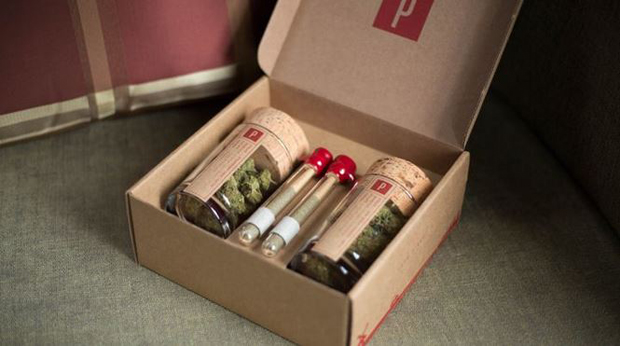
Potbox, a new startup, is offering monthly deliveries of high-grade medical marijuana to your door each month.
As of right now, Potbox is only available to people in San Francisco and, soon, Los Angeles. For a monthly fee of $150, subscribers get a box each month containing two quarter-ounce cylinders of different strains of weed, plus two perfectly-rolled joints that will presumably be smoked immediately upon delivery. The presentation of the weed – long an under-appreciated element of the illicit delivery market – looks pretty cool.
Riding the dual waves of the on-demand economy and the boom in farm-to-table food sourcing, Potbox appears to be a dream to those who value both convenience and goods with a story to tell. According to its website, Potbox offers “the highest quality, most ethically-grown medical cannabis available and deliver[s] it fresh from the farm directly to your door each month.”
Like the explosion of companies that offer “personal stylists” who will send a trunk of clothes to your apartment every month, Potbox is all about your tastes. “Tell us what you like or dislike,” the website invites. “Our expert curators will find two different strains of premium medical cannabis that will exceed your expectations.”
Potbox certainly knows its audience, as the website touts the importance of protecting “all phases of the plant’s life cycle” and “respecting the rights and the livelihoods of the people who cultivate and harvest our cannabis.”
All you need to sign up is a medical marijuana ID card, which, as of October 2014, over 570,000 California residents had state-wide.

As much of the nation slowly trends towards more progressive pot laws, we’ll likely see more above-board delivery operations springing up across the country. Illicit weed delivery services have long been popular in U.S. cities both large and small, even spawning the cult-classic web series-turned-HBO show High Maintenance.
At the same time, the on-demand economy has in many cities severed the traditional relationship between employees and employers, as companies like Uber claim their drivers are not workers, but independent contractors. Potbox, whose goods will be delivered by a California collective called FoggyDaze, doesn’t exactly fit into the so-called “sharing economy,” in which start-ups like the delivery app Postmates allow anyone to become a part-time delivery person. But it’s not hard to imagine a day in the future when the same person will pick up your weed, your allergy prescription, your salad, and your bottle of premium vodka and bring them all to your door.
Sounds like paradise! Except, of course, for many of the workers who enter into the on-demand economy out of precarity and with little, if any, protections from bad working conditions. And although recent lawsuits against Uber suggest the courts may step in and reclassify independent contractors and employees, the risk of exploitation remains. While these labor issues may not apply to Potbox, they’re likely to come into focus as similar services grow.
